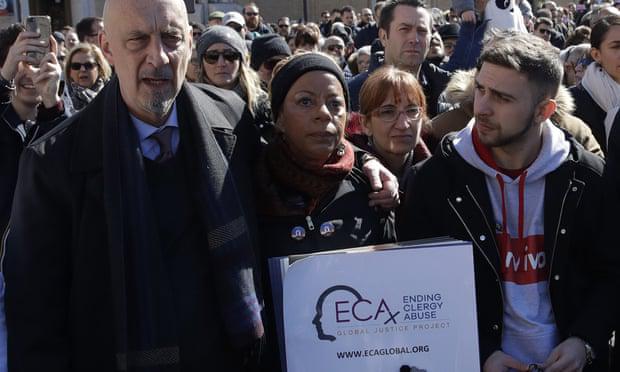|
Campaigners furious after pope's 'defensive' speech on child abuse
By Angela Giuffrida
[with video] Pontiff accused of ‘undoing tiny bit of progress’ achieved at high-profile Vatican summit Activists for survivors of clerical sexual abuse have reacted furiously after Pope Francis failed to promise a “zero tolerance” approach to paedophile priests and the bishops who cover up their crimes as he closed a landmark summit at the Vatican. Francis vowed that the Roman Catholic church would “spare no effort” to bring abusers to justice and would not cover up or underestimate abuse, but a significant part of the pontiff’s closing speech focused on the prevalence of child abuse across society. Citing data, he said that the majority of cases arose within families and that the perpetrators of abuse were “primarily parents, relatives, husbands of child brides and teachers”. He also said that online pornography and sex tourism amplified the issue. “Our work has made us realise once again that the gravity of the scourge of the sexual abuse of minors is, and historically has been, a widespread phenomenon in all cultures and societies,” he said. “I am reminded of the cruel religious practice, once widespread in certain cultures, of sacrificing human beings – frequently children – in pagan rites.” While the pope acknowledged that the occurrence of the sexual abuse of children within the Catholic church was even more “scandalous” due to its incompatibility “with her moral authority and ethical credibility”, his speech failed to reflect the concrete action that survivors of sex abuse were hoping for. Anne Barrett Doyle, the co-founder of Bishop Accountability, which tracks clergy sex abuse cases, described the speech as “recycled rhetoric”. “I am utterly stunned,” she told the Guardian. “The pope has undone the tiny bit of progress that possibly was achieved this week. He was defensive, rationalising that abuse happens in all sectors of society. Ironically and sadly, he exhibited no responsibility, no accountability and no transparency.” About 190 bishops and cardinals attended the four-day summit, during which they heard traumatic testimony from those who had been raped and molested by priests, and about the indifference that the Catholic church’s hierarchy has shown towards them. One woman from Africa told the summit that the priest who began raping her at age 15 forced her to have three abortions, and beat her when she refused him sex. A survivor from Chile told the bishops and religious superiors they had inflicted even more pain on victims by discrediting them and protecting the priests who abused. “The presidents of the bishops’ conferences going home today will rest easy,” added Doyle. “They will scrutinise the [pope’s] talk and try to analyse the question: ‘Do I have to do anything differently or risk losing my job?’ The answer is no, there’s nothing in this talk today that threatens the position and power of bishops. It is so far from what was needed.” Father Hans Zollner, a member of the summit’s organising committee, said during a press briefing on Sunday that the event was a “quantitative and qualitative leap”, adding that the church must “own” the problem and that it was in the process of “turning things around”. But dozens of survivors of clerical sexual abuse who travelled to Rome on the expectation of a stronger outcome felt severely let down. “I’ve been waiting for seven years … others have been waiting for much longer,” said Alessandro Battaglia, 22. “After four days, we get a piece of paper full of banality, and this is the church in which we’re expected to believe. We are very disappointed.” Francesco Zanardi, who set up Rete l’Abuso, Italy’s only network of clerical abuse survivors, said: “We’re being taken for a ride. We expected a concrete response but nothing useful has come out of this. In this speech the church makes itself out to be the victim – but we are the victims.” Peter Isley, spokesperson for Ending Clergy Abuse, an organisation that brings together activists from different countries, criticised the pope’s speech for failing to signal that church leaders would get tough on removing from the ministry priests guilty of abuse and bishops who covered up for them. “A child will be harmed today due to what the pope didn’t say today,” he said. “What he’s actually saying to all bishops is to ‘keep on covering it up’. He talks about families … well he is protecting his family. Why can’t he enact zero-tolerance into church law? He has the power to do that. The problem is his internal conflict – does he protect the priests within his family or the victims of abuse?” A list of 21 “reflection points”, written by the pope and handed out on the first day of the summit, is expected to provide the basis for the development of new anti-abuse procedures for bishops. To date, many priests accused of assaulting children have simply been transferred to other parishes. Alberto Athié left the priesthood after church leaders ignored his reports of abuse committed by the late Marcial Maciel, a prominent Mexican priest who sexually abused several children. “My bishop told me that either I shut up or leave,” said Athié, whose testimony contributed to an investigation by the Boston Globe in 2002 into the scale of clerical sexual abuse. “They said Father Maciel was very dear and had done many good things. The church doesn’t want to recognise or take responsibility for something that they have expressly hidden across the whole world.”
|
.
Any original material on these pages is copyright © BishopAccountability.org 2004. Reproduce freely with attribution.
